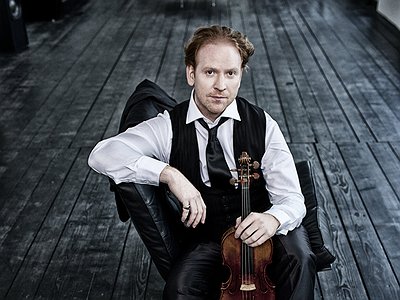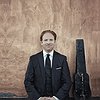Freedom through technique
Daniel Hope, it seems, doesn't believe in the concept of rest. Ever since first picking up the violin at the age of four, Hope has regarded music as a vehicle for quenching his thirst for knowledge, his desire to engage, his ambition to bring about change. It is by no means an exaggeration if his website presents him not just as a violinist, but as a one-man-army of broadcaster, author, musical activist and producer, with three books, various festivals and a variety of sociopolitical projects to his credit. In sync with this penchant for diversity, his discography has spanned the gamut from well-known classics to adventurous discoveries, from the well-measured beauty of the baroque to the sonic architecture of 21st century composition, from the East to the West. It is the same eclectic blend of styles, eras and cultures, which mark his live performances at concert halls and clubs and which he, to this day, still considers the most rewarding aspect of his work. The thrill of interacting directly with an audience, of bringing the music to life in a two-way exchange is what keeps him going despite running a seemingly impossible schedule – who needs sleep, after all, when life feels like a dream?
When did you start playing your instrument, and what or who were your early passions and influences?
I began playing the violin when I was four years old. By complete co-incidence I grew up around Yehudi Menuhin, who was an important early influence, as were the musicians who were regular guests at his house, such as Mstislaw Rostropovich, Ravi Shankar and Stéphane Grapelli.
How would you describe the relationship with your instrument?
I am particularly lucky to have the 1742 Guarneri del Gesù known as the “Ex-Lipinski” put at my disposal. She is my heart and soul.
What do you personally consider to be incisive moments in your artistic work and/or career?
Being inspired by Menuhin, studying the violin with Zakhar Bron, performing with Menahem Pressler, helping to run the Savannah Music Festival and recording for Deutsche Grammophon.
What are currently your main artistic challenges, including questions of technique relating to your instrument? In how much does this technique allow you to bring out the essence of a piece with more clarity?
Technique is the be all and end all of great music making. Without technique, you are not able to express your musical ideas as freely and as completely as you can. My practising every day is all about keeping my technique in check, and, most importantly, improving it.
What do you start with when working on a new piece?
The complete score. Then the ‘story’ behind the composition or the composer, complete research. Once I have learned the notes, then the real music making begins.
There's a wide range of nuances between trying to stick as closely to the score as possible and the kind of freedom Glenn Gould would indulge in. How do you balance your personal emotions/ideas and the intentions of the composer in your interpretations?
The score and thoughts of the composer are the reason we do what we do. It’s our job to represent their feelings and their emotions. On the other hand we have to find a way to convey these feelings through our own language. But if we impose too much of ourselves on the music, we are not being true to the composer. Originality is not something you can plan or force, it’s either there or it’s not.
Do you feel it important that an audience is able to deduct the processes and ideas behind a work purely on the basis of the music? If so, how do you make them transparent? Do you, in general, feel that, as part of your work, music needs to be explained or should it retain its “inexplicable nature”?
Music does not need to be explained, but very often people react extremely positively if it is. Especially in the case of contemporary music, where just a few words from the interpreter can mean the difference between total disinterest and the discovery of something wonderful.
In how much, do you feel, are creative decisions shaped by cultural differences – and in how much, vice versa, is the perception of music influenced by cultural differences?
I believe that music transcends cultural differences, in the same way that it transcends religion and race. I do not believe that music can change the world, but it can make people think.
What constitutes a good live performance in your opinion? What’s your approach to performing on stage?
A great concert is about certain magical moments - if you are listener it means you are transported, at least once, to another world. For me, performing live is the greatest thrill one can have.
The effect of a piece doesn't merely depend on the performance of the musicians, but also on the place it is performed at. How do you see the relationship between location and sound? In how far do you feel the current system of concert halls is still the right one for classical music in general?
I disagree. I think the level and intensity of a performance is much more important than the location. Having said this, to make music in a great concert hall is to present music in the best possible listening circumstances. I think, principally, we should be aiming to get more young people into our best halls. If we can’t, then there are always the clubs and lounges.






